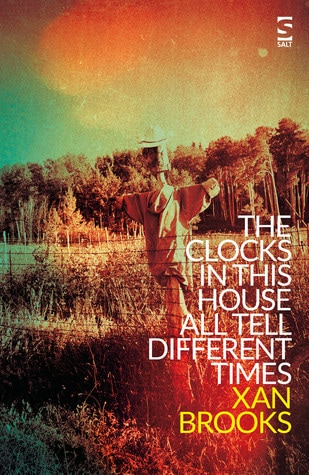| Officially speaking, these men do not exist. You could say that whatever goes on never actually happened. Whenever relations your youngster has with my chaps do not really exist. But if that’s the case then your conscience is clear. Five years on from the end of the First World War and the flu pandemic that slaughtered many more, fourteen-year-old Londoner, Lucy Marsh, is taken on a summer Sunday afternoon, along with three other teenagers, deep into Epping Forest for a rendezvous with the Scarecrow, the Tin Man, the Cowardly Lion and Toto. There, something momentous happens, in a way that, in tune with uncensored fairytale traditions, is both matter-of-fact and magical, beautiful and horrific. |
In award-winning writer, editor and broadcaster, Xan Brooks’ debut novel, three anomalous subcultures from the margins of society, meet, mingle and mutually exploit each other until the fantasy they’ve co-created comes to a violent end. Lucy and the other teenagers are orphans, a source of cheap labour to the grandparents with whom they live. Unloved and neglected, their encounters with the ‘funny men’ in the forest make them feel special and they look forward to the Sunday evenings, so long as they can push the ‘unmentionables’ that take place after sundown out of their minds. The sense of foreboding in the first quarter of the novel is such that it comes as a perverted relief to learn that these children are providing a sexual outlet for men who’d struggle to find it elsewhere.
The four men, nicknamed after Dorothy’s companions in The Wonderful Wizard of Oz, are the war’s forgotten heroes, injured in both body and mind, so horrifically disfigured by burns and amputation that they have chosen official death rather than attempting to return to their previous lives. Sheltered by the eccentric landowner and advocate of liberal causes, Lord Hertford, in the grounds of Grantwood estate, they exist in a state of limbo, separate, not only from the world at large but from the eternal house party hosted by the earl’s dilettante son.
When the antics in the woods are brought to an abrupt end, Lucy follows the quixotic Winifred to Grantwood to work ‘freelance’ for the men. When the girls are included in the revelries at the house fuelled by brandy and cocaine, the men come along too, and the worlds of entrepreneurial adolescence, monstrous disability and the repulsive indolence of the upper classes momentarily merge, until they turn in the direction of mutually assured destruction.
Published by the wonderful Salt, The Clocks in This House is the stuff of fairytale and nightmare, a historical novel of morality and mores, and the underworld we’d rather not see. Although the subject matter is bleak, Xan Brooks’ beautiful prose renders it strangely uplifting, and there’s a bright ending for some. Like nothing I’ve read before, I look forward to discovering what others make of it. I hope the judging panellists for the literary prizes agree with my verdict.






















 RSS Feed
RSS Feed





















